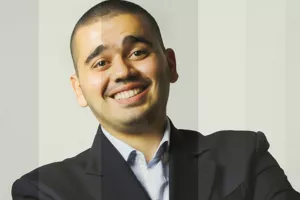
UTM program helps Syrian refugee students on the path to higher education
A new initiative at U of T Mississauga is helping Syrian students gain higher education and accreditation in Canada.
UTM’s Pathways programs were established to help prospective students who were taking a non-traditional route to higher education. “Not everyone comes to university the same way,” says Pathways Programs manager Adam Fraser. “Pathways helps students who are transitioning to UTM, such as seniors, mature students and those coming to us from college programs.”
Fraser saw a unique opportunity to help Syrian students displaced by conflict in their homeland. Fraser’s research showed that there are nearly 1,300 Syrian students living within 60 km of the UTM campus. Fraser started receiving calls from prospective Syrian students and their sponsors who were looking for a way to get their education back on track.
“We can take that same Pathways model and transition Syrian students,” he says. “There will be three kinds of students—those who are ready to go to school now, those who were in university and need to transfer, and those who have a degree but need to transfer their qualification to Canadian equivalents.”
Some of the unique challenges presented by prospective refugee students include those arriving without documentation or with degrees that are different from those granted in Canada. “If an applicant has official documents, they would apply directly as any other student would,” Fraser say. “But if they are missing that documentation, we can help them access the system to determine their level of education and where they would fit at U of T.”
Nazar Poladian is one of two Syrian refugee students who will be starting at UTM in September 2016. Poladian was in his third year of a marketing degree program when his family fled Syria on one of the last flights out of Aleppo in 2012. He spent three years in Lebanon where he tried to finish his degree before the family landed in Canada, ultimately settling in Scarborough.
Since arriving in Canada, Poladian has working in digital marketing and banking, but he hit dead ends in trying to complete his education “I have 48 courses finished, but no degree completed,” he says. “The Canadian government was flexible to give us permanent residence, but finding an official education status was more difficult. No one seemed to have a solution. I thought I would have to start again.”
After delivering a TEDx U of T talk on the refugee experience in 2016, Poladian connected with Fraser who was able to assess Poladian’s transfer credits before he applied to U of T. “Adam pushed a lot, he explained a lot,” Poladian says. “He guided me, especially for the scholarship and to assess my transfer credits. UTM started that process even before I applied officially—other universities didn’t offer that.”
In September, Poladian will enter UTM as a transfer student in the Digital Enterprise Management program. He has also been granted one of six $10,000 scholarships from U of T’s Scholars-at-Risk program. The financial help is a big relief, Poladian says, as he is working full-time to help support his family financially.
Fraser says that the Syrian Pathways program will be promoted more officially this fall. “The word is getting out already, even though we haven’t officially promoted it yet,” he says. “It shows that there is a need amongst this population. As Syrian students start thinking about school and getting a higher education, they will find us. UTM can support these students knowing that they need that extra help."
Read more about how the U of T community is helping Syrian refugees >
